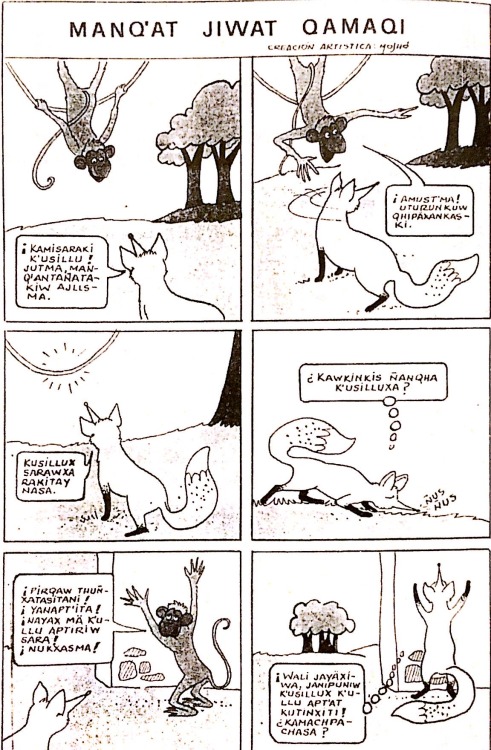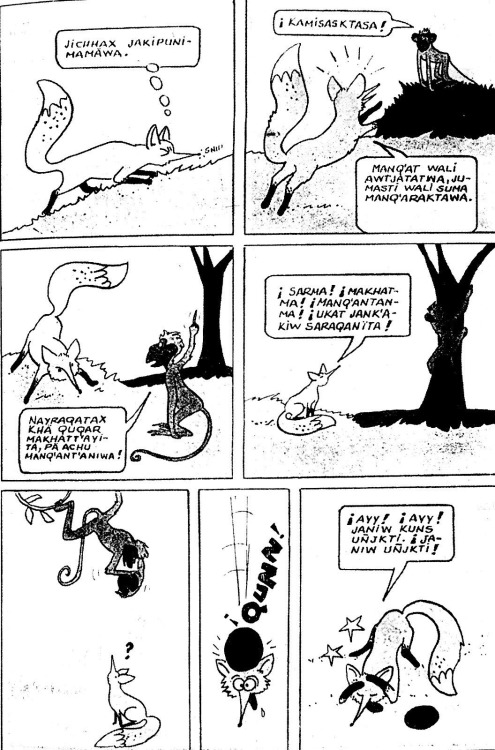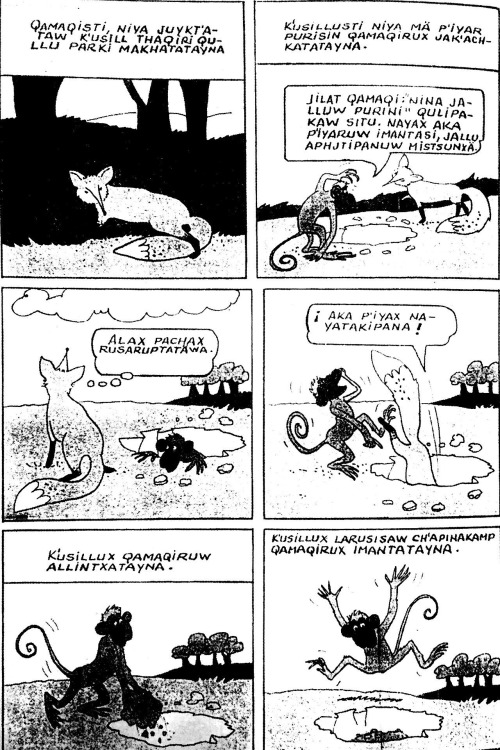Hello @kutyozh! I was your Secret Santa for @langblrsecretsanta2021, and since you said you were i
Hello @kutyozh! I was your Secret Santa for @langblrsecretsanta2021, and since you said you were interested in/studying Aymara, I thought that I would give you a gift related to that. This is a scan of a comic from Literatura aymara: antología, compiled by Xavier Albó and Félix Layme; the comic itself was drawn by Moshó for the Proyecto Bilingüe de Puno in Peru and is based on a traditional story. I’ve transcribed it below, including the original Aymara, the Spanish translation from the book, and my own English translation of the Spanish for non-Spanish speakers who are interested. Hope it’s helpful and/or enjoyable, and best of luck with your studies! MANQ’AT JIWAT QAMAQI • EL ZORRO MUERTO DE HAMBRE • THE STARVING FOX—¡Kamisaraki k’usillu! Jutma, manq’antañatakiw ajllsma.—¿Cómo estás, mono? Ven, te he escogido para comer.“How’s it going, monkey? Come, I’ve chosen you to eat.”—¡Amust’ma! Uturunkuw qhipaxankaski.—¡Piénsatelo! Detrás tuyo está el oso.“Think carefully! There’s a bear behind you.”—(Kusillux sarawxa rakitay nasa.)—(¡Oh! El mono se ha escapado.)(Oh no! The monkey escaped.)—(¿Kawkinkis ñanqha k’usilluxa?)—(¿Dónde está el maldito mono?)(Where’s that damn monkey?)—¡Pirqaw thuñxatasitani! ¡Yanapt’ita! ¡Nayax mä k’ullu aptiriw sara! ¡Nukxasma!—¡La pared está por caerse! ¡Ayúdame! Yo iré a buscar un palo: ¿Podrías aguantar?“The wall’s about to fall! Help me! I’m going to go look for a stick, can you hold it up?”—(¡Wali jayäxiwa, janipuniw k’usillux k’ullu apt’at kutinxiti! ¿Kamachpachasa?)—(¡Ya hace mucho rato y el mono nunca llega con el palo! ¿Qué hago?)(It’s been a long time and the monkey never brought the stick! What do I do?)—(Jichhax jakipunimamäwa.)—(Ahora sí que te voy a encontrar.)(Now I’m really going to find you.)—¡Kamisasktasa!—¿Cómo estás?“How are you?”—Manq’at wali awtjatatwa, jumasti wali suma manq’araktawa.—Muerto de hambre. Y tú eres muy buena comida.“Starving. And you’re very good food.”—Nayraqatax khä quqar makhatt’ayita pä achu manq’ant’aniwa!—Antes déjame subir a aquel arbol para comer un par de frutas.“First let me climb that tree to eat a couple of fruits.”—¡Sarma! ¡Makhatma! ¡Manq’antanma! ¡Ukat jank’akiw saraqanïta!—Ve, sube y come. Pero baja rápido.“Go, climb up and eat. But come down quickly.”—¡Ayy! ¡Ayy! Janiw kuns uñjkti. ¡Janiw uñjkti!—¡Ay! ¡Ay! ¡No veo nada!“Oww! Oww! I can’t see anything!”Qamaqisti, niya juykt’ataw k’usill thaqiri qullu parki makhatatayna.Y el zorro, casi ciego, dice que subió a la ladera del cerro buscando al mono.And the fox, almost blind, they say he climbed up the side of the hill looking for the monkey.K’usillusti niya mä p’iyar purisin qamaqirux jak’achkatatayna.Pero el mono llegó a la orilla de un pozo y se acercó al zorro:But the monkey came to the edge of a well and brought the fox over.—Jilat qamaqi: “Nina jalluw purini” qulipakaw situ. Nayax aka p’iyaruw imantasi, jallu aphjtipanuw mistsunxä.—Hermano zorro: “Está por llover fuego” me ha dicho la señora Aguila. Yo me meteré en este pozo y saldré cuando haya pasado la lluvia. “Brother Fox, Mrs. Eagle told me, ‘It’s about to rain fire.’ I’m going to get into this well and I’ll come out when the rain is passed.”—(Alax pachax rusaruptatawa.)—(Pues sí, el cielo está rosado.)(Well indeed, the sky is pink.)—¡Aka p’iyax nayatakipana!—¡Este pozo es mío!“This well is mine!”K’usillux qamaqiruw allintxatayna.Dice que el mono enterró bien al zorro.They say that the monkey buried the fox well.K’usillux larusisaw ch’apinakamp qamaqirux imantatayna.El mono, riéndose, dejó bien guardado al zorro con espinos.The monkey, laughing, left the fox well-guarded with thorns. -- source link
Tumblr Blog : guillemelgat.tumblr.com
#langblrsecretsanta2021#generalreading#generalreference#generaltranslation#spanishtranslation#spanishreading#spanishgeneral


